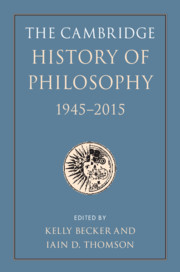Book contents
- The Cambridge History of Philosophy, 1945–2015
- The Cambridge History of Philosophy, 1945–2015
- Copyright page
- Contents
- Contributors
- Preface and Acknowledgments
- Introduction
- Part I Analytic Philosophy
- Section One Language, Mind, Epistemology
- Section Two Logic, Metaphysics, Science
- Section Three Analytic Moral, Social, and Political Philosophy
- 16 The Revival of Virtue Ethics
- 17 Kantian Ethics
- 18 Consequentialism and Its Critics
- 19 The Rediscovery of Metanormativity
- 20 Constitutivism
- 21 John Rawls’s Political Liberalism
- 22 The Twilight of the Liberal Social Contract
- 23 Feminist Philosophy and Real Politics
- Section Four Analytic Aesthetics and Philosophy of Religion
- Part II Continental Philosophy
- Part III Bridge Builders, Border Crossers, Synthesizers, and Comparative Philosophy
- Part IV Epilogue: On the Philosophy of the History of Philosophy
- References
- Index
19 - The Rediscovery of Metanormativity
From Prichard to Raz by Way of Falk
from Section Three - Analytic Moral, Social, and Political Philosophy
Published online by Cambridge University Press: 08 November 2019
- The Cambridge History of Philosophy, 1945–2015
- The Cambridge History of Philosophy, 1945–2015
- Copyright page
- Contents
- Contributors
- Preface and Acknowledgments
- Introduction
- Part I Analytic Philosophy
- Section One Language, Mind, Epistemology
- Section Two Logic, Metaphysics, Science
- Section Three Analytic Moral, Social, and Political Philosophy
- 16 The Revival of Virtue Ethics
- 17 Kantian Ethics
- 18 Consequentialism and Its Critics
- 19 The Rediscovery of Metanormativity
- 20 Constitutivism
- 21 John Rawls’s Political Liberalism
- 22 The Twilight of the Liberal Social Contract
- 23 Feminist Philosophy and Real Politics
- Section Four Analytic Aesthetics and Philosophy of Religion
- Part II Continental Philosophy
- Part III Bridge Builders, Border Crossers, Synthesizers, and Comparative Philosophy
- Part IV Epilogue: On the Philosophy of the History of Philosophy
- References
- Index
Summary
W. D. Falk’s (1947–48) address to the Aristotelian Society – delivered April 19, 1948 – marks a turning point in twentieth-century metaethics. Whereas early twentieth-century metaethics was characterized by questions regarding the semantic and metaphysical commitments of moral terms, fin de siècle metaethics has been largely concerned with normativity more broadly construed. While this shift is generally traced to the 1970s or later, I argue that the beginnings of the metanormative turn can be found much earlier in the work of philosophers such as Falk and Frankena. In fact, there is a sense in which there never was any “turn” to the metanormative; rather, the metaethical and the metanormative have always been two independent yet intertwined branches within twentieth-century ethical theory. That said, the metanormative literature of the late twentieth and early twenty-first century has been characterized by a tendency to conceive of the normative fundamentally in terms of reasons for action, which in turn has shaped how metanormative questions regarding the authority of morality are framed. After documenting the turn to reasons, I end with a discussion of some recent alternatives to the “reasons-first” approach to these questions.
- Type
- Chapter
- Information
- The Cambridge History of Philosophy, 1945–2015 , pp. 264 - 274Publisher: Cambridge University PressPrint publication year: 2019



